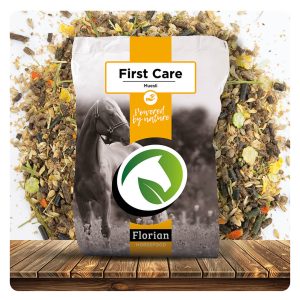
The ingredients in Florian First Care muesli are real helpers for the horse’s stomach and intestines.
But what do you need these auxiliaries for?
A strong immunity is important for your horse.
This is because the immune system protects against harmful external influences such as viruses, bacteria, fungi or parasites.
The immune system is invisible but an army of different white blood cells.
These all have their own function and are constantly ready to defend the body.
Did you know that the gut is the body’s largest immune organ?
80% of all immunological cells that detect harmful external pathogens are located in the intestines.
There are also billions of bacteria active in the intestines, these bacteria we call the intestinal flora.
The intestinal flora plays a crucial role in the regulation of the immune system.
The ingredients in Florian First Care granola are real helpers for the horse’s stomach and intestines.
Bran have a low starch and high fiber content, this positively stimulates digestion.
Oats: A gluten-free source of starch in the form of oats was chosen.
This grain contains many vitamins and minerals.
Due to its high content of unique and soluble beta-glucans, oats have a cholesterol lowering effect.
Oats have a regulatory effect on the amount of insulin and glucose in the blood.
The oat grain is also the only grain that accumulates oil in its seeds.
Thus, oats contain many health-promoting components.
Saccharomyces cerevisiae: is a yeast proven effective in horses for supporting fermentation and inhibiting intestinal acidosis.
Apple pulp: Finally, the intestinal flora gets another boost from the addition of dried apple pulp.
The pectin present ensures an optimal pH level in the intestines which stimulates the development of good intestinal flora.
In addition, pectin has a high water-binding capacity which can help horses with diarrhea or manure water.
First Care can be fed dry or as a slop.
Author: Dr. Hilde Vrancken
Vet
Discount Applied Successfully!
Your savings have been added to the cart.